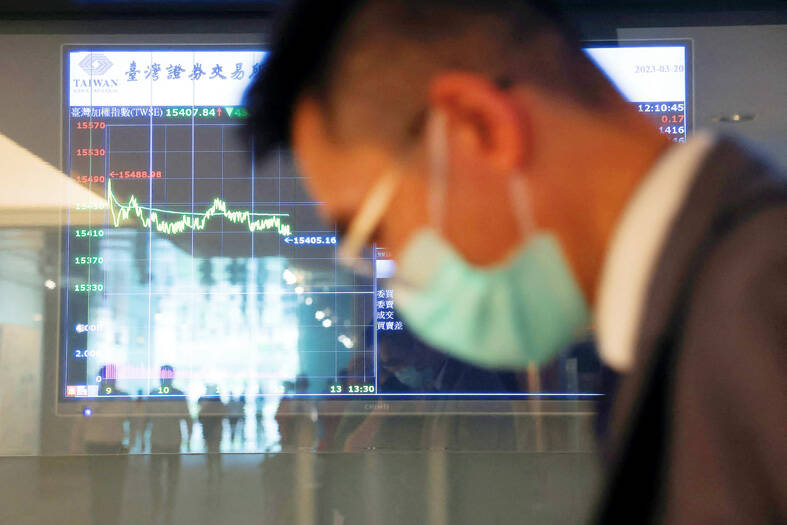The TAIEX yesterday closed lower after fluctuating in a narrow range throughout the session, as market sentiment remained haunted by financial woes in the US and European banking sectors.
The benchmark index closed down 32.99 points, or 0.21 percent, at 15,419.97, in tandem with declines in regional stock markets, despite news of UBS Group AG’s takeover of embattled Credit Suisse Group AG and global central banks’ pledges to provide liquidity to troubled lenders.
Turnover on the local main board fell ahead of a policymaking meeting scheduled by the US Federal Reserve for today and tomorrow, totaling NT$189.698 billion (US$6.20 billion), compared with NT$264.593 billion a session earlier, Taiwan Stock Exchange data showed.

Photo: Annabelle Chih, Reuters
Foreign institutional investors sold a net NT$4.78 billion of shares on the main board yesterday.
In the local financial sector, Cathay Financial Holding Co (國泰金控) lost 1.95 percent, Fubon Financial Holding Co (富邦金控) fell 0.90 percent and China Development Financial Holding Co (中華開發金控) closed down 0.82 percent, while CTBC Financial Holding Co (中信金控) shares rose 0.72 percent.
In Hong Kong, HSBC Holdings PLC dropped 6.23 percent, while Standard Chartered PLC fell 7.3 percent and Bank of East Asia Ltd gave up 4.5 percent, as investors weighed a collapse in the value of additional tier 1 (AT1) bonds issued by lenders following the terms of the Credit Suisse’s rescue.
Japanese banks were also mostly lower, with Mizuho Financial Group Inc shedding 2.3 percent and smaller bank Resona Holdings Inc down 3.7 percent.
In Australia, Macquarie Group Ltd sank 4.6 percent.
The AT1 notes were created after the 2008 global financial crisis to ensure that losses in times of crises would be borne by investors, rather than taxpayers bailing out borrowers, but the complete write-down of Credit Suisse’s AT1 debt as part of a Swiss bailout had investors in the US$275 billion market scrambling to determine how much protection the notes offer in a crisis.
The Financial Supervisory Commission yesterday said that Taiwan’s major insurance companies — Cathay Life Insurance Co (國泰人壽), Fubon Life Insurance Co (富邦人壽), Shin Kong Life Insurance Co (新光人壽), Nan Shan Life Insurance Co (南山人壽), China Life Insurance Co (中國人壽) and Taiwan Life Insurance Co (台灣人壽) — have more than NT$100 billion in combined exposure to Credit Suisse, but none of them held any of the Swiss lender’s AT1 bonds.
“Despite regulators’ efforts to stem the panic in the global banking system, investors remained worried that possible further financial woes from other banks will emerge to send equity markets into turmoil,” Concord Securities Co (康和證券) analyst Kerry Huang (黃志祺) said. “That’s why local financial stocks, as well as the entire main board, weakened today.”
The losses came ahead of the Fed’s policy meeting this week, with speculation mounting that it is becoming more dovish toward its monetary policy.
“The market has widely anticipated the US central bank will raise its key interest rates by only 25 basis points this time and stop its rate hike cycle afterwards,” Huang said.
Additional reporting by Bloomberg

PATENTS: MediaTek Inc said it would not comment on ongoing legal cases, but does not expect the legal action by Huawei to affect its business operations Smartphone integrated chips designer MediaTek Inc (聯發科) on Friday said that a lawsuit filed by Chinese smartphone brand Huawei Technologies Co (華為) over alleged patent infringements would have little impact on its operations. In an announcement posted on the Taiwan Stock Exchange, MediaTek said that it would not comment on an ongoing legal case. However, the company said that Huawei’s legal action would have little impact on its operations. MediaTek’s statement came after China-based PRIP Research said on Thursday that Huawei filed a lawsuit with a Chinese district court claiming that MediaTek infringed on its patents. The infringement mentioned in the lawsuit likely involved

Taipei is today suspending work, classes and its US$2.4 trillion stock market as Typhoon Gaemi approaches Taiwan with strong winds and heavy rain. The nation is not conducting securities, currency or fixed income trading, statements from its stock and currency exchanges said. Authorities had yesterday issued a warning that the storm could affect people on land and canceled some ship crossings and domestic flights. Taiwan Semiconductor Manufacturing Co (TSMC, 台積電) expects its local chipmaking fabs to maintain normal production, the company said in an e-mailed statement. The main chipmaker for Apple Inc and Nvidia Corp said it has activated routine typhoon alert

GROWTH: TSMC increased its projected revenue growth for this year to more than 25 percent, citing stronger-than-expected demand for AI devices and smartphones The Taiwan Institute of Economic Research (TIER, 台灣經濟研究院) yesterday raised its forecast for Taiwan’s GDP growth this year from 3.29 percent to 3.85 percent, as exports and private investment recovered faster than it predicted three months ago. The Taipei-based think tank also expects that Taiwan would see a 8.19 percent increase in exports this year, better than the 7.55 percent it projected in April, as US technology giants spent more money on artificial intelligence (AI) infrastructure and development. “There will be more AI servers going forward, but it remains to be seen if the momentum would extend to personal computers, smartphones and

Catastrophic computer outages caused by a software update from one company have once again exposed the dangers of global technological dependence on a handful of players, experts said on Friday. A flawed update sent out by the little-known security firm CrowdStrike Holdings Inc brought airlines, TV stations and myriad other aspects of daily life to a standstill. The outages affected companies or individuals that use CrowdStrike on the Microsoft Inc’s Windows platform. When they applied the update, the incompatible software crashed computers into a frozen state known as the “blue screen of death.” “Today CrowdStrike has become a household name, but not in